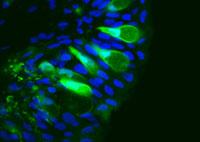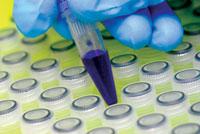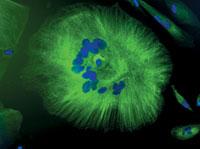Research divisions
Here are a few examples of research expertise of The Roslin Institute.
Functional Genetics and Development

Ambition: To enhance fundamental knowledge of the control of growth and differentiation, animal physiology and welfare, aiming to underpin the development of new technologies for farm animal production, husbandry and genetic improvement.
Key Areas: Animal Stem Cells; Genome Engineering Technologies; Animal Models of Development and Disease
World-leading expertise in:
- Farm animal and avian genome engineering
- Large animal models of disease
- Gene targeting and transgenic strategies in model systems and farm animals
- Companion and farm animal stem cells, induced pluripotent stem cells, cancer stem cells and avian germline stem cells
- The basis of sexual dimorphism in birds
- Mechanisms of calcification
Related Links: Division of Developmental Biology
Genetics & Genomics

Ambition: To advance understanding of complex animal systems and to develop improved predictive models through the application of numerical/computational approaches in analysis, interpretation, modelling from the level of DNA to whole organisms and populations.
Key Areas: From Sequence to Consequence – Converting ‘omics Data into Knowledge / Predictive Models; Translation of Quantitative Genetic Information into Breeding Strategies
World-leading expertise in:
- Understanding the genetic control of complex traits, including traits of economic interest (e.g. egg or milk production) and responses to infectious disease, in farmed animals.
- Genetic resistance to disease
- Using bioinformatics as tool to understand biological systems
- Comparative and Evolutionary Genomics
- Modelling Cellular and Tissue Systems
- Epidemiology and Population Biology
Related Links: Division of Genetics & Genomics
Infection & Immunity

Ambition: To enhance understanding of the mechanisms of host defense against infection, and translate this understanding into prevention and treatment.
Key Areas: Genetics of disease resistance; innate and mucosal immunity of poultry and livestock; infectious disease pathogenesis
World-leading expertise in:
- Immunity
- Mucosal immunity, NK cells, macrophages
- Practical vaccination strategies
- Specialised techniques: lymphatic cannulation, organoid cultures
- Host-pathogen interactions
- Genetic approaches to increasing disease resistance
- Diagnostics and epidemiology
- Important pathogens
- Bacteria (Escherichia coli, Campylobacter species, Salmonella species, Staphylococcus species, Mycobacteria species, Streptococci, Rhodococcus equi, Burkholderia mallei)
- Parasites (Theileria species, trypanosomes, Eimeria, toxoplasma)
- Viruses (influenza, infectious bronchitis virus, porcine reproductive and respiratory syndrome virus, porcine epidemic diarrhea virus, parvovirus, herpesviruses)
Related Links: Division of Infection & Immunity
A summary of all research interests can be found here.
Just get in touch and we can help you find out mutual areas of interest as well as pinpoint relevant expertise and facilities.


